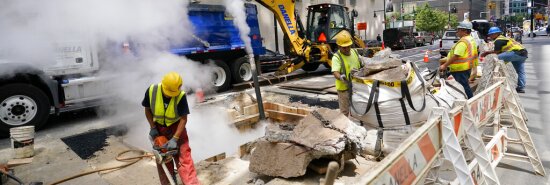
Permitting reform needed to unlock domestic labor
Mark McManus
Video Embed
The passage of meaningful legislation to reinvest in our critical infrastructure over the past year or so has created an inflection point for the U.S. economy. While these bills will spur robust investment in our communities across the country, there is work to be done to ensure that the legislation creates good-paying jobs, bolsters our energy security, and sets the United States on a path to meet our shared decarbonization and climate goals.
The road ahead requires meaningful permitting reform and a highly skilled workforce to move shovel-ready projects across the country into action.
MANCHIN TRIES REVIVING PERMITTING REFORM WITH AMENDED BILL
Last year, Congress passed the historic Infrastructure Investment and Jobs Act of 2021, including some $9.5 billion in funding clean hydrogen provisions and the development of Regional Clean Hydrogen Hubs. These hubs, expected to be located all over the country, are key to a domestic hydrogen economy that could produce 700,000 jobs by 2030 and 3.4 million jobs by 2050.
The passage of the Infrastructure Investment and Jobs Act heralded a rebirth in investment in infrastructure not seen since President Dwight Eisenhower’s interstate highway system: tunnels, roads, bridges, and the energy infrastructure we need to power a 21st-century economy. Importantly, the labor protections included in the landmark bipartisan legislation, such as the use of registered apprenticeships and prevailing wage provisions, create family-sustaining jobs that give working families a fair shot at the middle class. Simply put, this legislation will put skilled union members to work as they build our energy future with fair wages and benefits.
The more than 362,000 hard-working men and women of the United Association of Union Plumbers and Pipefitters stand ready to serve our nation, just as we have done for generations. But this requires clear permitting requirements that ease unreasonable delays and decrease unnecessary red tape. Permitting delays are costly for America’s economy, with as much as $3.7 trillion in construction delays and environmental costs. Even worse, permitting delays create instability (unemployment) for our members and their families. As a result, the United Association strongly supports the passage of the bipartisan Energy Independence and Security Act of 2022.
This bill would speed up the permitting process for crucial domestic infrastructure in an all-of-the-above energy approach that would unlock billions of investment dollars in key energy sectors such as carbon capture, nuclear, natural gas, and hydrogen. This reform legislation will modernize and streamline the permitting review process to ensure that we continue to meet the stringent standards required on these jobs, just as our members always have and will continue to do, while reducing delays and jump-starting construction. There is broad support among industry, as well as private and public sector leaders, to pass this bill as soon as possible. Doing so would ensure we create the types of clean energy jobs that will power us into the future.
At the end of the day, permitting reform is crucial to unlocking the full potential of hydrogen that can be produced in the U.S. and will create hundreds of thousands, if not millions, of good jobs. Infrastructure investments in hydrogen production, manufacturing, fueling, and other end-uses can accelerate hydrogen-related job growth. Hydrogen has already created 500,000 jobs worldwide, and increased U.S. investment can accelerate U.S. hydrogen jobs, providing secure employment for American workers.
Union labor is the backbone of our nation. A more modern and efficient permitting process is good for workers, builders, communities, and consumers. Our members are already building the projects that will propel our country into the low-carbon energy transition, meaning the public does not have to choose between addressing our climate goals or securing good-paying union jobs — we can, and we will, do both. Hydrogen provides a meaningful solution that addresses the need to lower our carbon footprint while preserving the most innovative workforce in the world. A cleaner, more resilient energy future is within reach, and union labor will build it.
CLICK HERE TO READ MORE FROM THE WASHINGTON EXAMINER
Mark McManus is the general president of the United Association of Union Plumbers and Pipefitters.
